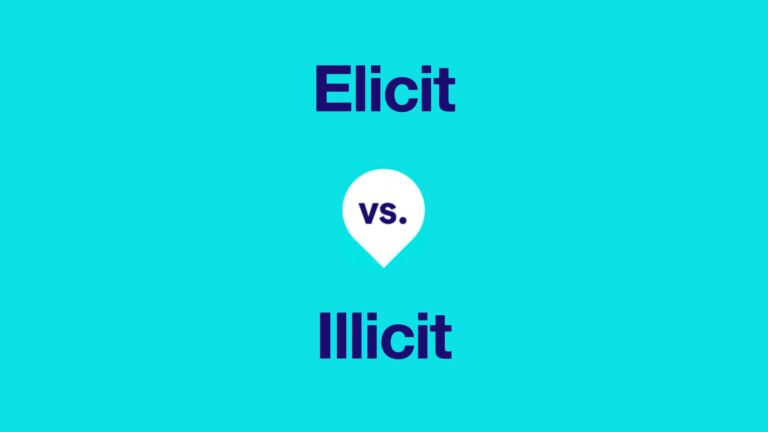Have you ever read a sentence and paused, wondering whether it should be elicit or illicit? You’re not alone. These two words look similar, sound almost alike, and are often tested in SAT, GRE, or GMAT questions. But using the wrong one can completely change the meaning of a sentence.
The good news? Once you understand the difference, a few simple memory tricks can make remembering them effortless. This guide will help you spot which one belongs in every context.
Quick Comparison
| Word | Part of Speech | Meaning | Example |
| Elicit | verb | To draw out, evoke, or provoke a response | “The teacher’s question elicited thoughtful answers from the class.” |
| Illicit | adjective | Forbidden, illegal, or morally wrong | “The police cracked down on illicit drug sales.” |
Think of it like this:
- Elicit = to draw something out
- Illicit = not allowed
How to Use Elicit
Elicit is almost always a verb. It describes the action of bringing something out—an answer, a reaction, a response, or an emotion.
Examples:
- The interviewer tried to elicit more details about her career goals.
- His speech elicited laughter from the audience.
- Certain questions are designed to elicit critical thinking.
Synonyms for elicit: evoke, provoke, bring out, draw, induce.
⚠️ Standardized test tip: Elicit often appears in reading comprehension or sentence completion questions where a stimulus or action produces a reaction. If the sentence is about causing a response, elicit is usually correct.
How to Use Illicit
Illicit is an adjective describing something forbidden or illegal, often with a moral or legal dimension.
Examples:
- The authorities investigated the illicit trade of endangered species.
- The novel explores the consequences of illicit love affairs.
- Students were warned against illicit copying of assignments.
Synonyms for illicit: illegal, unlawful, forbidden, prohibited, unauthorized.
Bonus usage: Illicit can describe not only criminal activity but also socially frowned-upon actions. For example, “an illicit glance” in literature or conversation indicates something morally improper rather than legally criminal.
Common Confusions and Test Traps
- These two words are often tested together because they look alike. One key hint is to ask yourself: Is the sentence about drawing out a response, or about something forbidden? That usually points you to the correct choice.
- Unlike some homophones, elicit and illicit rarely overlap. You can safely remember that one is action-oriented (verb), the other is descriptive (adjective).
- In standardized tests, you might see tricky sentences like:
- “The new policy was designed to ___ honest feedback from employees, while simultaneously preventing any ___ activity.”
- Correct answers: elicit / illicit.
Memory Tricks
- Elicit = Evoke/Extract → both start with “E.” Think: “Elicit evokes.”
- Illicit = Illegal / Improper → both start with “I.” Think: “Illicit is illegal.”
- Ask yourself: Does the sentence involve producing a reaction (elicit) or describing something forbidden(illicit)?
Extended Examples
Elicit:
- “The comedian’s joke elicited a roar of laughter.”
- “Good research questions can elicit nuanced responses from participants.”
- “The detective hoped his questions would elicit the truth.”
Illicit:
- “The government cracked down on illicit gambling operations.”
- “They discussed the dangers of illicit drug use among teenagers.”
- “The book explores the repercussions of illicit relationships in a strict society.”
FAQs
Can elicit ever be a noun?
No, it’s almost exclusively a verb meaning “to draw out or evoke.”
Is illicit only about criminal activity?
Not necessarily. Illicit can describe actions that are morally wrong or socially unacceptable, even if they aren’t illegal.
Why do standardized tests focus on these words?
Because they look similar, appear in formal writing, and test your ability to detect subtle differences in meaning. Mistaking one for the other can change the intended meaning of a passage completely.

Leave a Reply